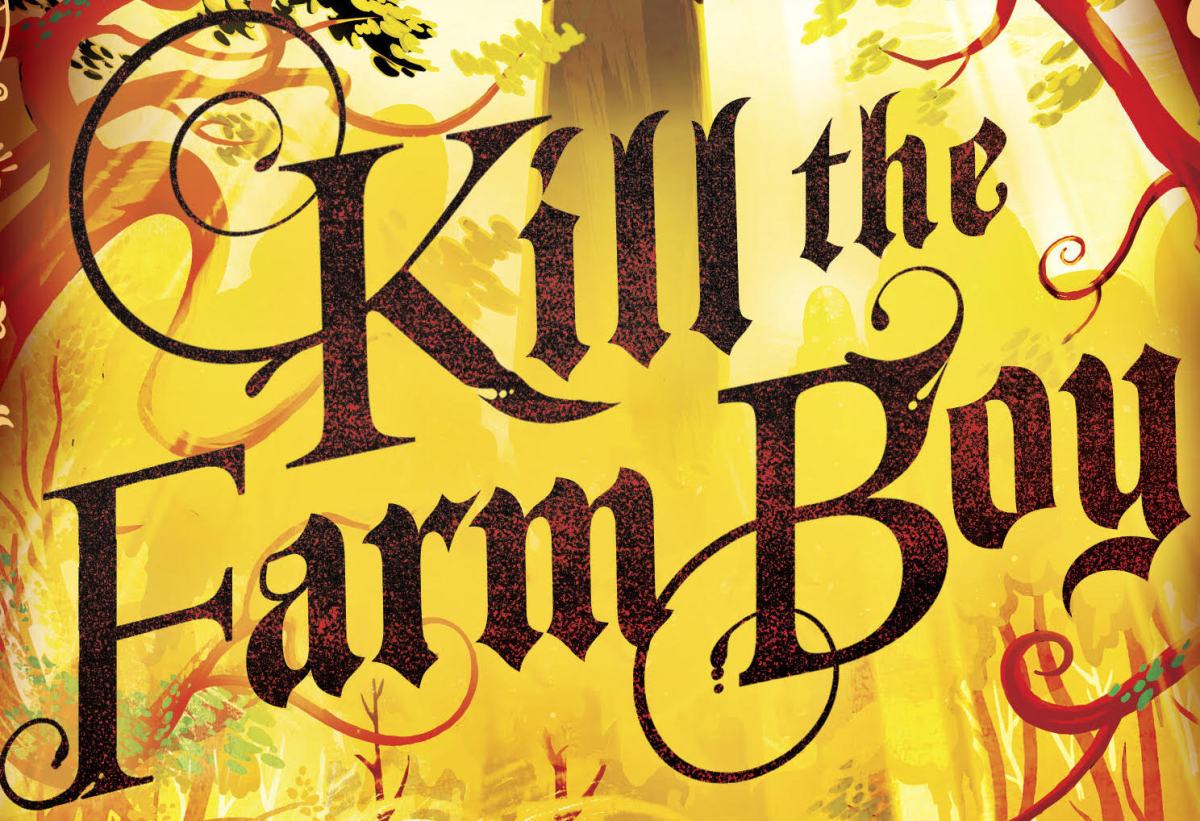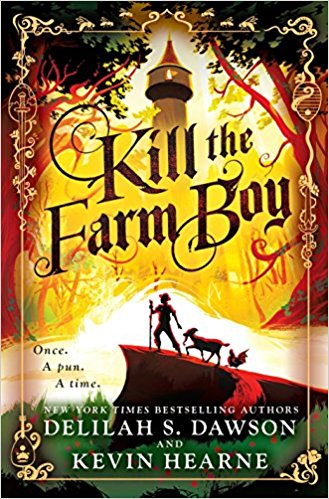
KILL THE FARMBOY
Author: Delilah S Dawson & Kevin Hearne
Genre: Fantasy
Publisher: Del Rey
A Review by CL Vitek

Once upon a time, in a faraway kingdom, a hero, the Chosen One, was born . . . and so begins every fairy tale ever told.
This is not that fairy tale.
There is a Chosen One, but he is unlike any One who has ever been Chosened.
And there is a faraway kingdom, but you have never been to a magical world quite like the land of Pell.
There, a plucky farm boy will find more than he’s bargained for on his quest to awaken the sleeping princess in her cursed tower. First there’s the Dark Lord, who wishes for the boy’s untimely death . . . and also very fine cheese. Then there’s a bard without a song in her heart but with a very adorable and fuzzy tail, an assassin who fears not the night but is terrified of chickens, and a mighty fighter more frightened of her sword than of her chain-mail bikini. This journey will lead to sinister umlauts, a trash-talking goat, the Dread Necromancer Steve, and a strange and wondrous journey to the most peculiar “happily ever after” that ever once-upon-a-timed.
So a bard, barbarian, evil lord, sand witch, and a talking goat walk into a… you know what? I think this one speaks for itself. Kill The Farmboy is exactly what it says on the tin. When Worstley, a rural farmboy in the land of Pell, is named The Chosen One by a drunken pixie with dubious hygiene who also manages to give the family goat – Gustave – the ability to speak, he sets off to find his fortune. When the duo’s path collides with Fia, buxom barbarian horticulturist, their meeting quickly careens off the rails of expected fantasy narrative.
This first collaboration between Delilah S. Dawson (Star Wars: Phasma) and Kevin Hearne (The Iron Druid Chronicles) is comedic fantasy that takes a playful jab at the time-worn tale of the unremarkable young man handed a cosmic destiny. Kill The Farmboy upends the standard white-male-power-fantasy in favor of a story heavy on laughs without taking itself too seriously.
Where Hearne and Dawson really shine is in the dynamics of their little adventuring party. While the reader doesn’t spend a lot of time with Worstley (for reasons that quickly become apparent), the rest of the cast could easily fall into fantasy stereotypes. Instead, rich characters play on the tropes they’ve historically grown from. Fia, the chainmail bikini-clad barbarian from a faraway place, is more interested in finding the perfect specimen for her future garden than her magical blade. Argabella, a royal bard under a fuzzy curse, has a greater affinity to accounting than music. The Dark Lord Toby is better suited to producing bread-based magic than he is at doing anything particularly dark or nefarious while his ward, Polto, makes for a most clumsy, uncoordinated rogue. Then there is Gustave. A billy-goat suddenly burdened with human-level intellect and the ability to talk, he doesn’t think much of humans or quests. He’d rather be left to nibbling the occasional boot.
Compelling and largely genuine, the character interactions drive the story and kept me interested despite some pacing issues. They feel more like a tabletop adventuring party than stock characters for a quest. It makes their journey more appealing and feels more organic. The blossoming romance between characters is sweet; the reader figures it out before they do and reading through as they realize then admit those feelings is pretty cute. More surprisingly, the story deals with the issue of grief and loss in a more nuanced fashion than it does most other things. That was one of the strongest parts in the book. Though when the plot undermines the moment only a few chapters later, it left me puzzled about why those events unfolded at all.
It’s when Kill The Farmboy meanders on side-quests and pointed social commentary that weakens the overall story. There are some absolutely hilarious moments, including one incident of trollsplaining that might sound a little too familiar for some readers, but these can drag on a bit too long sometimes. The book works best when it’s overturning tropes. Yet that reliance on pushing those tropes is a weakness to the overall plot as well.
This is a very silly book in the best way possible. It never falls too heavily into parody and instead acts as playful homage to the great fantasy quest books. This is partly due to the absurdity of Pell. In this world, tropes (like princesses being cursed or the whole concept of chosen ones) are simply part of life. Much like Discworld or even Oz, the internal logic and rules of the realm are simply accepted by the characters.
Verdict
Fans of Terry Pratchett and Dianna Wynne Jones will really enjoy the first journey into Pell. It’s filled with clever asides and dissection of tropes. More Monty Python’s Quest for the Holy Grail than Conan the Barbarian, both influences are felt in the story. While the inclusion of so many puns can seem a little tedious at times when the plot stalls in favor of the humor, the story is a genuinely light-hearted romp gently teasing conventional fantasy. The pace meanders sometimes but the quest is well worth the journey.
Kill the Farmboy is a great first installment for the forthcoming Tales of Pell series. I’ll gladly come back for the second one, No Country for Old Gnomes, when it’s released in late 2018. Dawson and Hearne have created a world perfect for more fun, campy fantasy stories.

![[REVIEW] ‘ABSOLUTION’ GIVES READERS ANOTHER FORBIDDEN-LOVE FANTASY TALE](https://geekd-out.com/wp-content/uploads/2021/10/240494361_116834494034925_5087866440602926148_n-150x150.jpg)

